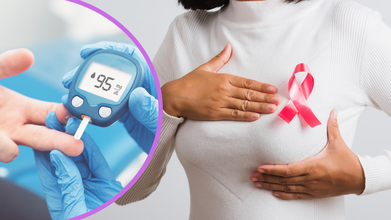- Health Conditions A-Z
- Health & Wellness
- Nutrition
- Fitness
- Health News
- Ayurveda
- Videos
- Medicine A-Z
- Parenting
- Web Stories
Male Menopause: Is Andropause A Reality Or A Myth?

Credits: Canva
Hormone changes are a natural part of aging, but they affect men and women differently. In women, menopause marks the end of fertility and involves a sharp decline in reproductive hormones over a relatively short period. For men, the hormonal shift is slower and more gradual. This has led to the popular but misleading idea of a “male menopause.”
Debunking the Male Menopause Myth
The term “male menopause” is often used in media and casual conversations to describe aging-related hormone changes in men. But unlike female menopause, men do not experience a sudden stop in hormone production.
Instead, testosterone—the primary male sex hormone—declines slowly, about 1% per year from around age 30 or 40. This gradual process is medically referred to as late-onset hypogonadism or age-related low testosterone. It’s not inevitable, and not all men experience symptoms.
What the NHS Says
According to the NHS, some men in their late 40s to early 50s experience symptoms such as:
- Low libido and erectile dysfunction
- Mood swings and irritability
- Reduced muscle mass and exercise capacity
- Fat accumulation, including belly fat or “man boobs” (gynaecomastia)
- Fatigue and sleep issues
- Poor concentration and short-term memory
These symptoms may be similar to those seen in menopause, but the causes are often more complex and not always hormonal.
Causes Beyond Hormones
The NHS cautions against labeling these changes as “male menopause,” since many symptoms stem from lifestyle, psychological, or social factors, not just hormones. Stress, anxiety, depression, poor diet, lack of sleep, and inactivity can all contribute.
For some men, this period may coincide with a "midlife crisis," marked by career worries, relationship stress, or existential concerns. These factors can affect emotional well-being and physical health—sometimes mimicking hormone-related symptoms.
When It Is Hormonal
In fewer cases, symptoms are linked to a genuine medical condition called late-onset hypogonadism, where the testes produce insufficient testosterone. This can occur due to:
- Obesity
- Type 2 diabetes
- Certain medications (like opioids)
- Pituitary gland issues
Hypogonadism can be diagnosed through blood tests and medical evaluation. It is not considered a normal part of aging.
Recognizing Symptoms of Low Testosterone
Men with clinically low testosterone may experience:
- Decreased sexual desire or erectile issues
- Hot flashes or sweating
- Breast tenderness
- Loss of bone density or height
- Fatigue, low mood, or reduced motivation
- Sleep disturbances
- Decreased muscle mass and increased body fat
Because these symptoms are non-specific, doctors recommend testing only when multiple signs are present.
Treatment Options and Risks
If testing confirms low testosterone, and lifestyle factors are ruled out, testosterone therapy may be considered. Guidelines vary:
The American College of Physicians recommends it for men with sexual dysfunction who want to improve performance.
The Endocrine Society supports therapy for men with symptoms and confirmed low levels.
However, therapy comes with risks, such as increased chance of heart problems, blood clots, prostate or breast cancer, and infertility.
What You Should Do
If you’re experiencing troubling symptoms, talk to your GP. They may explore emotional or lifestyle causes first. Treatment could include therapy, stress management, diet, exercise—or in some cases, hormone testing.
This Common Lifestyle Disease Could Be Increasing Your Risk Of Aggressive Breast Cancer: Study

(Credit-Canva)
Breast cancer cases are increasing globally, with a significant rise in aggressive forms, such as triple-negative breast cancer, particularly in women under 40. This has caused many people to wonder how they could curb their risk of getting cancer and whether it is something they can control. Scientists have been researching various links that could lead us to a way we can effectively lower the
A new study reveals a hidden link between two major health crises: Type 2 Diabetes and breast cancer. Researchers have discovered that the metabolic changes from diabetes can actually fuel the growth of aggressive breast tumors, especially the kind most common in younger women.
This research, from Boston University, suggests that Type 2 Diabetes doesn't just put your health at risk in general—it might actively weaken your body's ability to fight off cancer, allowing aggressive forms of the disease to thrive.
Does Diabetes Weaken the Body’s Defense?
The study, published in the journal Springer Nature, is the first to directly link tiny blood particles called exosomes from people with Type 2 Diabetes to a suppressed immune response within breast tumors. Think of exosomes as tiny messengers that carry information between cells. In individuals with diabetes, these messengers are altered and can essentially "retrain" immune cells inside a tumor. This process weakens the body's ability to contain and fight the cancer, allowing the tumor to grow and spread more rapidly.
What Is Triple-Negative Breast Cancer?
According to American Cancer Society, most breast cancers begin in the cells that line the milk ducts or the lobules, which are the milk-producing glands. These types of cancer are known as carcinomas or, more specifically, adenocarcinomas. Breast cancer is also classified by whether it has spread.
In situ (or "in its original place") breast cancer, also known as DCIS (Ductal Carcinoma In Situ), is a very early-stage cancer that has not spread beyond the milk duct where it started. It is considered a pre-cancer.
Invasive (or "infiltrating") breast cancer is any type of breast cancer that has grown and spread into the surrounding breast tissue.
Triple-Negative Breast Cancer
This is an aggressive type of cancer that lacks three key receptors: estrogen, progesterone, and HER2 protein. Because it tests "negative" for all three, it doesn't respond to some of the most common cancer drugs that target these receptors. It accounts for about 15% of all breast cancers.
Can Diabetes Care Help Lower Cancer Risk?
This groundbreaking research helps to answer a long-standing question: why do people with Type 2 Diabetes often have worse outcomes with breast cancer treatment?
This finding is particularly important because it suggests that traditional treatments, like immunotherapy, may not be as effective in patients who also have diabetes. The researchers believe that understanding this link will lead to the development of more personalized and effective treatments for millions of people.
Diabetes And Cancer: What Should You Eat?
According to the Diabetes UK, about 1 in 5 people with cancer have diabetes. Type 2 diabetes and several types of cancer share common risk factors. Obesity and being overweight significantly increase the risk for both conditions. Carrying extra weight can raise your chances of developing Type 2 diabetes as well as cancers of the gullet, bowel, breast, womb, and kidney. Additionally, both diseases become more common as people get older.
The connection between Type 1 diabetes and cancer is a bit more complex. While Type 1 diabetes can increase your risk for certain cancers—such as those of the liver, pancreas, kidney, and stomach—some evidence suggests it might actually lower your risk for others, like prostate or breast cancer. This area of research is still developing.
Simple Steps to Reduce Your Risk
Taking a proactive approach to your health can lower your risk of developing cancer. By focusing on a few key lifestyle habits, you can make a significant difference:
- Maintain a healthy weight for your height.
- Eat a healthy, balanced diet rich in fruits, vegetables, and whole grains.
- Stay active with regular physical activity.
- Avoid smoking.
Al Roker's Weight Loss Journey: Health Secrets That Keep Him Going At 71

(Credit-alroker/Instagram)
Al Roker, the 71-year-old cohost of the Today show, has a simple but powerful life goal: to be there for his family, especially his granddaughter. In an interview with the Prevention, Al detailed various parts of his journey, his motivations, how he got to where he is and where he wishes to see himself in the future.
One of the goals the spoke of was being there for his granddaughter’s graduation. This goal is personal for Roker, who has faced significant health challenges. In 2002, he was at his heaviest and struggling with health issues, including knee pain that made it difficult to even carry his daughter. Roker, who has three children with his wife Deborah Roberts, admits he was stuck in a cycle of "all-or-nothing" dieting, which he says was a "negative loop" of restricting food and then binge-eating.
Al-Roker's Diet: What He Eats In A Day
Al explained how he knows that the gastric bypass surgery wasn’t the end of his journey. Roker focuses on daily habits to maintain his health. He cooks most meals at home to control ingredients and eats small, frequent meals with a focus on protein.
Breakfast: Nonfat yogurt and a banana, followed by a cold-brew coffee.
Lunch: A salad with salmon or chopped chicken and grains.
Dinner: Lean protein, like fish or chicken, and steak about once a week.
He also prioritizes exercise. His favorite form is walking, and he tries to walk a couple of miles a day. When he's too busy for a full workout, he finds ways to be active, like walking to work, which is about 15 blocks.
Can You Eat Whatever You Want After Gastric Bypass Surgery?
When one undergoes a gastric bypass it changes the way their body handles food. The surgery basically makes your stomach smaller by closing it off with staples, according to MedlinePlus. You will not only eat less, but your body may not absorb all the calories from your food. Does this mean you can have an unrestrictive diet?
The answer is, not entirely. According to University Hospitals, your diet will change a lot in the first two months after surgery.
Weeks 1-2
You will be on a liquid-only diet. This includes water, broth, tea, and protein drinks. You can't have any carbonated drinks.
Weeks 3-4
You will move to a puréed diet. This means all your food must be blended into a smooth texture. You can have things like blended chili, puréed cottage cheese, and thinned Greek yogurt.
Weeks 5-6
You will eat a soft diet. Meals should be very soft and moist. This could include eggs, tuna salad, or baked fish with cooked vegetables.
After 45 days
You can slowly start eating regular foods again. You should be careful with things that are harder to digest, like bread, rice, pasta, red meat, nuts, and fizzy drinks.
How Does Eating Look Like After Gastric Bypass?
Experts suggest to maintain your weight loss, aim for three high-protein meals a day. Protein helps you feel full for about four hours. It's also important to listen to your body. Don't wait until you are starving to eat, but don't eat just because it's a certain time.
Eat when you are hungry. Your body uses food for energy, so try not to eat your last meal right before bed.
When you do eat, always have your protein food first. If you still have room, then eat your vegetables. If you need help with a meal plan, a dietitian can help you create one that fits your life and your tastes. Here are some tips you can follow when you are eating outside.
- You can still enjoy meals at restaurants, but it's best to plan ahead.
- Look at the menu online before you go. Choose dishes with a focus on lean protein and non-starchy vegetables.
- Order a box with your meal so you can put away the extra food right away.
- Split a large meal with someone else at your table.
- If you don't see a good main dish, order a side of protein and a side of vegetables to create your own meal.
Monsoon Stomach Flu: Why Seasonal Gastroenteritis Hits Harder In Rainy Months?

Credits: Health and me
When the monsoon rains set in, they bring in a much-needed respite from the scorching summer heat but the relief is usually brief, as the damp, humid conditions become a breeding ground for waterborne infections and gastrointestinal diseases. The most prevalent of these seasonal diseases include gastroenteritis, an illness that infects the stomach and intestines, making individuals susceptible to dehydration, exhaustion, and, in severe cases, life-threatening complications.
High humidity, standing water, dirty food sources, and variable temperatures all combine to provide excellent breeding grounds for pathogenic microbes. The digestive system, sensitive to infection, one of the first to respond. Unhygienic foods, street foods open to unclean conditions, and dirty fruits and vegetables serve as vectors for parasites, viruses, and bacteria.
As Dr. Aditya Shah, MBBS, MD (General Medicine, Gastroenterology, Apollo Spectra Hospital, Chennai), puts it, "The monsoons usher in many diseases along with relief from the hot summer weather. All these diseases primarily target the gut. Inadequate food hygiene, consumption of dirty water and humidity during these periods put individuals at risk of contracting several diseases such as gastroenteritis."
In this period, these are usual diseases like seasonal gastroenteritis, typhoid fever, hepatitis A and E, cholera, and amoebiasis that peak in populations. All of them have the common factor as being a result of contamination either via unsafe water for drinking, poor food handling, or contact with carriers.
What Is Seasonal Gastroenteritis?
Seasonal gastroenteritis, which is also known as "stomach flu," is one of the most common digestive diseases reported during the wet season. It is a condition that causes inflammation in the stomach and intestines and is precipitated by viral, bacterial, or parasitic pathogens.
Dr. Shah points out, "Stomach flu, or seasonal gastroenteritis, is an infection with inflammation of the stomach and intestines, most commonly caused by viral, bacterial, or parasitic pathogens. Symptoms may develop within hours to days of exposure."
The symptoms are cramping of the abdomen, diarrhea, nausea, vomiting, and fever. Some patients may also have muscle aches, headache, and severe tiredness. In children and the elderly, dehydration becomes a deadly complication, characterized by intense thirst, decreased urination, and lightheadedness.
How Infections Spread During Monsoon?
The most common sources of gastroenteritis are contaminated water and food. Street foods, which are subjected to dirty air and cooked in unhygienic conditions, become dangerous pleasures. Similarly, stored perishable food items, unwashed vegetables and fruits, and untreated water create conditions for bacterial propagation.
Viruses also play a major role. Rotavirus and norovirus are two such frequent culprits of viral gastroenteritis. Rotavirus causes irritation in the stomach and intestines, and norovirus is infamous for vomiting and diarrhea outbreaks. Both are easily contagious through dirty surfaces and direct physical contact, so they are particularly hard to contain in overcrowded areas during the rainy season.
Common Gastrointestinal Diseases That Occur During Monsoon
While gastroenteritis steals the show, a number of other GI diseases peak in this season:
Typhoid Fever
Due to Salmonella typhi, typhoid is transmitted by contaminated food and water. Lasting fever, headache, and abdominal discomfort are classic signs, with serious cases causing harm to the intestines.
Hepatitis A and E
Liver infections caused by viruses, these diseases are generated due to bad sanitation conditions. They induce jaundice, weakness, and vomiting, with children being the most susceptible.
Cholera
Induced by Vibrio cholerae, cholera causes copious watery diarrhea and quick dehydration, necessitating urgent treatment to avoid death.
Amoebiasis
Induced by the parasite Entamoeba histolytica, it is caused by consuming food or water with fecal contamination. It manifests as pain in the abdomen and diarrhea, in severe cases causing liver abscesses.
All these diseases highlight the same fact: water and food hygiene are the key to healthy digestion in the monsoon.
What Are The Possible Complications of Gastrointestinal If Left Untreated?
Gastroenteritis seasonal, though sometimes relegated to a fleeting case of the stomach flu, can evolve into dire complications if left unattended. Dr. Shah admonishes that, in severe cases among children and older adults, dehydration can become life-threatening. Ongoing illness can also lead to electrolyte disorders, renal issues, and long-term debility.
One of the most important functions of management is diagnosis. Knowing if the disease is viral, bacterial, or parasitic guarantees treatment effectiveness. For instance, antibiotics are not required and indeed counterproductive in viral gastroenteritis but are a must in bacterial infections such as typhoid or cholera.
How To Prevent Gastrointestinal Diseases in Monsoon?
Though the threat of seasonal gastroenteritis exists, it is also quite preventable. Staying hydrated is crucial. Dr. Shah emphasizes the use of ORS (Oral Rehydration Solutions), which re-place lost water and salts, preventing severe dehydration. The other measures of prevention are:
- Consuming boiled or filtered water in place of untreated water
- Using freshly cooked home food as a priority
- Not consuming raw foods, unwashed vegetables, and roadside food items during the rainy season
- Washing hands properly before eating and after visiting the bathroom
- Proper storage of perishable foods to avoid bacterial growth
- These habits are simple yet extremely effective in reducing the risk of acquiring gastrointestinal infections by a huge margin.
When to See A Doctor?
Gastroenteritis is self-limiting in most cases, and hydration, rest, and food changes are enough. However, medical attention is sought immediately in the presence of recurrent vomiting, high temperature, presence of blood in stools, or features suggestive of severe dehydration.
Antimicrobials or antiviral drugs must be taken under the supervision of a doctor. Self-medication not only delays treatment but also fuels antimicrobial resistance.
The monsoon period is a paradox: a relief from the summer heat but also a time when the gut is particularly susceptible to infections. Seasonal gastroenteritis and other waterborne illnesses flourish in these conditions, reminding us of the tenuous nexus between environment, hygiene, and health.
With preventive care, proper food and water hygiene, and early medical treatment, the incidence of seasonal digestive diseases can be reduced. As Dr. Shah puts it, "Seasonal gastroenteritis is a very prevalent but avoidable disease in this season. With timely care, precautions, and awareness, this condition can be treated without serious complications.".
© 2024 Bennett, Coleman & Company Limited

